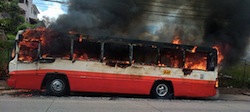A chilling phone call highlights some of the techniques that criminals in Honduras use to extort their victims, underscoring the ways in which extortion gangs take advantage of the country’s precarious security situation to instill fear.
In the recording of an extortion call obtained by the Honduran media, a man who identifies himself as “Mafia,” the leader of a gang with the same name, demands that the owners of a bus company pay him around $4,760 and a weekly “war tax.”
“If not,” the criminal states, “we are going to have it out with the owners of the buses and we’re going to burn them alive.”
During the call, “Mafia” tells the victim to meet him the following day at 11 a.m. and warns him not to contact the police or turn off his cellphone. He then describes threats the gang carried out in two of Tegucigalpa’s most violent neighborhoods, La Torre and Flor de Campo.
“We charged [another bus company] rent in Flor de Campo and we killed one of them because they didn’t believe us at the beginning. So if you don’t believe us, listen to me closely, because later I’m going to make you listen…if you don’t believe us the same thing is going to happen to you as happened in La Torre and Flor de Campo with me, get it?”
The extortionist then passes the phone to a man he identifies as his gunman, who also threatens the victim.
“If you don’t cooperate with us there will be a death tomorrow, do you understand?” the assassin says. “You have to take what Mafia said seriously because Mafia only has to say the word [to have you killed]. Are you listening to me?”
“Because I’m going to take care of you… [and] blow your brains out,” he adds.
The gunman then passes the phone back to “Mafia” and the victim asks “Mafia” if he can pay half of the extortion fee because he won’t be able to get all of the money together by the following day.
“Look,” the extortionist says. “It works like this. Here the gang has rules. I’m not going to let you pay half but we are going to help you, you are only going to give us 80,000 lempiras [around $3,800 dollars].”
In a final effort, the victim asks if he can make the payment in two installments, to which the caller simply replies: “You are not going to pay it in two payments.”
InSight Crime Analysis
The phone call illustrates the types of threats that criminals use to extort victims in Honduras, providing insight into a crime that forces thousands of businesses to close every year and serves as a major driver of violence in a country that has become one of the most violent on the planet.
The caller heard in the recording appears to be a member of an extortion gang known as La Mafia, which targeted the transportation sector and operated from prison with the help of accomplices on the outside. Honduras’ National Anti-Extortion Force (FNA) has identified the caller in the recording as Orlin Javier Alvarado Peralta, alias “Mafia,” the leader of the group. The extortion gang has since been disbanded, thanks in part to a victim who reported the crime, and Alvarado Peralta has been moved to a maximum-security prison, according to La Tribuna.
However, victims are often reluctant to report extortion to police. As evidenced by the recording, whoever receives such a phone call is working with little information at every stage of the conversation, putting the recipient of the call at a severe disadvantage. In the recording, the extortionist could be telling the truth about the recent attack on another bus company; or he could simply be using an event that he saw in the news to his advantage. The victim may never know. There are very frequent attacks on buses, taxis, and other transport companies in Honduras (as in Guatemala, where over 400 people died in such attacks last year), but it is hard to know who is responsible for these attacks as few are investigated.
As heard in the recording, the transportation sector is a major target for extortion in Honduras, earning criminal groups an estimated $27 million dollars a year. Between 2012 and 2014, 153 taxi drivers were murdered in cases that appeared to be linked to extortion, along with 32 passengers. Bus companies are also frequent targets, with extortion reaching such high levels in some areas of capital city Tegucigalpa that drivers have been forced to suspend bus routes.
SEE ALSO: Honduras News and Profiles
Although extortion is the principal source of revenue for the country’s powerful street gangs — the Mara Salvatrucha (MS13) and Barrio 18 — the crime is also carried out by corrupt police officers, and common criminals posing as gang members. According to Honduras’ National Anti-Extortion Force, as many as 70 percent of extortions are carried out by common criminals, rather than violent gangs, making it difficult, if not impossible, to discern between real threats and posers.
The deterioration of the Honduras’ security situation has been rapid and widespread. Victims of extortion frequently have cash on hand, operate in dangerous areas, lack protection, and have little information on which to base their decision when it comes to paying up or ignoring the call. Extortionists, as evident above, count on an uninformed public to ply their trade.

